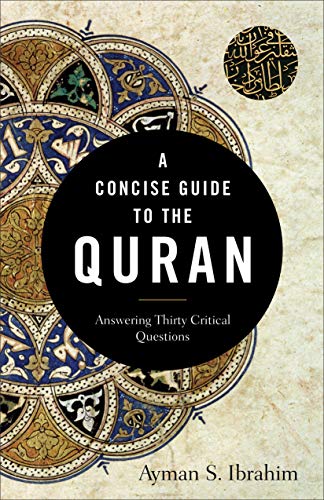A Book Review from Books At a Glance
by Ant Greenham
This little book is a gem. Written for non-Muslims with little or no exposure to Islam or the Quran, it draws on the latest scholarship, but is easy to read, providing clear, straightforward explanations throughout. It introduces outsiders to the diversity of Muslim perspectives (without abandoning the essentials) and encourages engagement with Muslims and ongoing exploration of key issues.
The author, Ayman Ibrahim, is Bill and Connie Jenkins Professor of Islamic Studies and Director of the Center for the Christian Understanding of Islam at The Southern Baptist Theological Seminary. A Christian Copt from Egypt, who grew up under the shadow of Islam, he holds two PhDs, from Fuller Theological Seminary and Haifa University. As such he is very familiar with the Quran and eminently qualified to introduce it to non-specialists in a helpful question and answer format.
As one would expect, a book like this cannot be exhaustive. Subjectively, I would have liked more information on Salman Rushdie, the author of The Satanic Verses. In 1989 Rushdie was forced into hiding with an assumed name (Joseph Anton) after Iran’s Ayatollah Khomeini issued a fatwa (scholarly opinion), encouraging his assassination. The surrounding (and subsequent) circumstances are fascinating, but Ibrahim wisely keeps his focus on the so-called satanic verses of the Quran, which stimulated Rushdie’s novel. Nevertheless, Ibrahim does provide helpful detail on fatwas in his glossary, which includes information on many other aspects of Islam.
In addition to the thorough glossary, a meticulous “sources consulted” section at the end reveals the depth of Ibrahim’s scholarship. His acumen emerges effortlessly in each of the questions he tackles, from the history of the Quranic text to its content, features and themes. Some questions, like “Did Muhammad Really Exist?” or “Are All Arabic Versions of the Quran the Same?” will surprise readers familiar with popular renditions of Islam, but these incisive questions are perfectly legitimate. Other questions, such as “What Is the Most Important Concept for Muslims in the Quran?” and “How Do Muslims Treat the Quran’s Verses on Violence Today?” are what one might expect in an introductory text. In any event, readers may examine specific questions in any order, or consider them together in logical sequence.
Ibrahim’s questions are especially penetrating as he moves from an examination of the Quran’s compilation to the establishment of the authoritative Quranic text in Cairo in 1924. Muslims believe emphatically that all Qurans today are identical, perfectly reflecting an eternal original in heaven, the so-called “Mother of the Book.” It was dictated word for word to Muhammad, written on different materials, compiled by the (third) caliph Uthman, preserved precisely through the centuries, and is identical to the 1924 Cairo edition now used throughout the Muslim world. The evidence challenges this neat schema though. According to Muslim tradition, about two decades after Muhammad’s death, Muslims from different locations recited the Quran differently.
Uthman thus authorized a new compilation, using an existing copy, and then had all the others burned. Ibrahim asks whether there were differences between the first and second copies. If not, why was a second necessary, but if so, which captured the heavenly original? Moreover, tradition indicates that key reciters of the Quran, highly regarded by Muhammad, possessed Qurans of their own, which differed from Uthman’s authorized version. Closer to the present, copies of the Quran passed down over the centuries contained many variant readings, but only one was standardized in 1924. It ignored other Quranic texts and is hardly an accurate reflection of the earliest compilation (let alone the exact copy of a “Mother of the Book”).
Moving to the Quran’s content, Ibrahim provides detailed advice on how to go about reading it, with helpful information on the English “translations.” (Since the Quran is only the Quran in Arabic, renditions into other languages are interpretations, rather than translations.) Penetrating questions continue in his discussion of tawhid, which refers to Allah’s pristine untouchable oneness. He cannot be compared to or associated with anyone or anything else. This presents problems. If a unitary Allah is merciful, and Muslims say he is, how could he be merciful before creating anyone on which to bestow mercy? But if he only became merciful after creating, that means he changed, which is unthinkable. By the same token, the idea of an uncreated “Mother of the Book,” existing eternally with Allah, raises the possibility that it too is deity, which grossly violates tawhid. In contrast, the Trinity does a much better job of addressing the need for diversity within the deity.
Of special interest to Christians is Ibrahim’s very thorough chapter on Jesus in the Quran. Muslims believe in Jesus, whom they call Isa. The Quran regards him very highly, leading some to argue it gives him divine status (when it calls him a Word from God). However, the Quran categorically denies his divinity and Muslim authorities overwhelmingly reject his crucifixion. With no Islamic Savior, this means the differences with the biblical Jesus are fundamental. Arab Christians are thus right to refer to him as Yasou’, to distinguish him from the Quranic Isa.
To close, it is noteworthy that Ibrahim treats Muslims with respect and clarifies that they are by no means monolithic. Taking a broad approach, he categorizes them as nominal or cultural (the vast majority), devout or religious (including both conservatives and progressives), and radical or extreme (fortunately a small minority). While his critical approach to the Quran would surprise (if not offend) Muslims across this spectrum, at the end of the day truth matters. For that reason, I have no hesitation in recommending this concise guide to anyone seeking to expand a minimal knowledge of Islam and the Quran. Nevertheless, with greater knowledge comes greater responsibility. My hope is that many will not only gain that knowledge but use it in respectful engagement with Muslims.
Ant Greenham is Associate Professor of Missions and Islamic Studies at Southeastern Baptist Theological Seminary.
